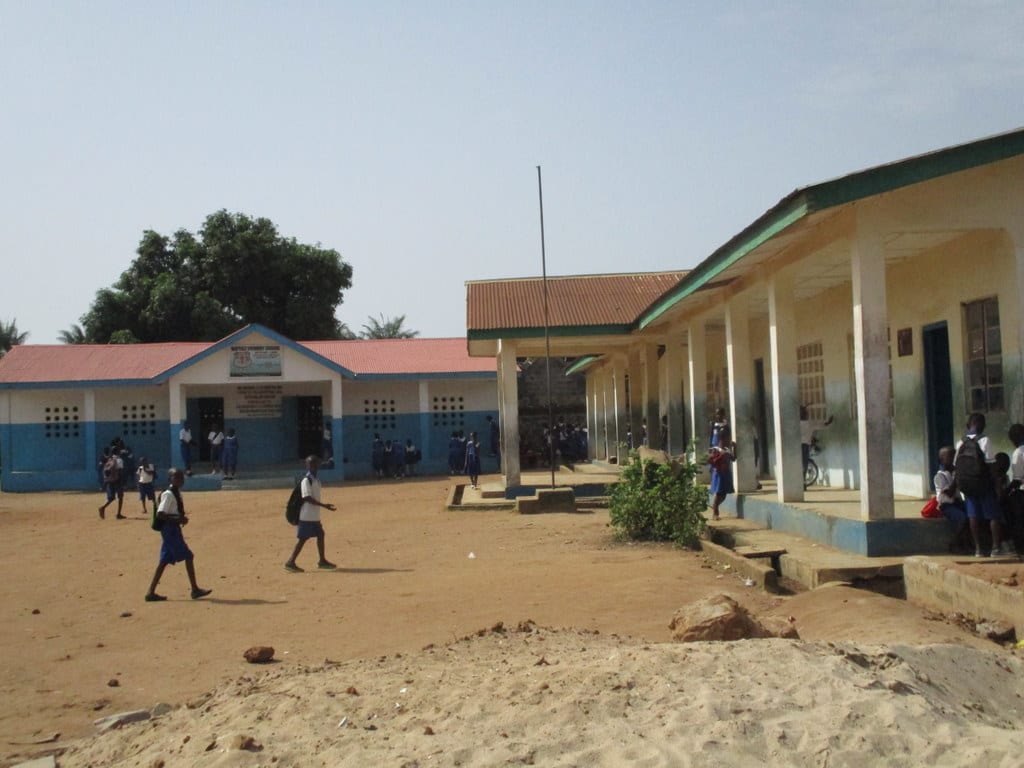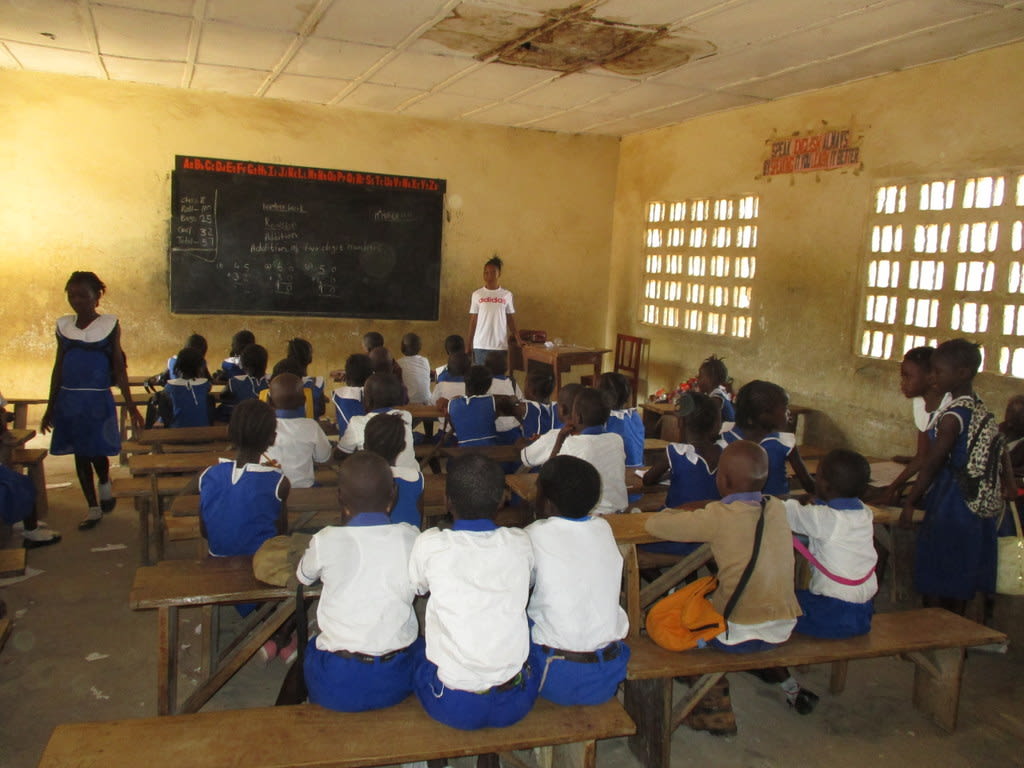Rotifunk Baptist Primary School is in the center of Lungi. There is practically very little vegetation, except for a few compounds where you can see mostly mango trees planted at the backyards. The town is less noisy in the mornings but gets very noisy in the afternoons when the kids are off from school.
The weather was very bright and very sunny on the day we visited.
It is located not too far from our office, so we spent a little under five minutes to get there. We got to this location on motor bikes. The roads are not that bad, even though they are dusty and have many potholes.
The School
Baptist Primary School is a Nigerian Missionary school, dubbed Nigeria Baptist Mission Sierra Leone. This school was founded by the Late Rev. Daniel A. Kamara and established in 1996 as a next step for students who attend Gateway Baptist Primary School in nearby Masoila.
It initially served 65 students in classes one to three and was held in a rented private home. The school relocated in 1998 to the Late Mr. Aruna Kanu’s house where the enrollment increased to 165 students and seven staff.

In 2003, the school relocated to its current location where they erected a structure with locally-produced materials, the product of which is called "bafa" in our local dialect. But in 2007, the Sababu education project came to their rescue and constructed a three classroom concrete building which currently hosts the majority of the pupils. Very recently, a German charity organization name GAGU SL also built a two classroom structure to reduce overcrowding in classes.
Enrollment today stands at 585 pupils with eight teachers and eight staff.
A Day in the Life
The kids wake up very early in the morning at about 5:30am to fetch water for the home and to tidy themselves before going to school at 8am for devotion.

After devotion, senior pupils are selected to clean the school environment and junior ones are given the task to sweep the classrooms and some others are selected to fetch water for the handwashing station and for drinking.
In the school, the water is stored in clean rubber buckets that have been placed in the corridor close to each classroom door.
Actual classes start at 9am and 2pm is the normal home hour.
Water
People in the community collect water from a number of sources. Some households have unprotected wells on their properties. They usually will allow limited access to these water points.
For others, they get the water from protected wells in the village or a nearby swamp. Most people in these communities would to go to project water sources because they are usually well-treated and access is based on first-come first-serve.
It is one thing to get to a well, but it is a totally different thing to access its water. These sources can be so overcrowded that some people will often leave their containers at the well and come back later to fill them - only to come back and discover that they were stolen.
These kinds of challenges motivate others to make the long walk to the open swamp. One has to cover a very great distance, and upon reaching there, ultimately collect contaminated water.
Human activity through laundering, bathing, etc., exposes the swamp to heavy contamination. Soap used to launder are made from poisonous chemicals like caustic soda which is not good for humans. Also wild animals often carry diseases that are not good for humans and they use this source as their primary source of water.
In this part of this country, water sources are often considerably affected by the weather. They are mostly dry in the dry season. Availability will fall the further we go into the dry season and some sources go completely dry as the dry season peaks.
The only source that does not experience seasonal variation is the packaged water source. Here quantity is dependent on how much a household or individual can afford to pay for.
There is a hand-dug well that a very good number of pupils depend on not just as a water source, but also as a food source. This is because most of them are coming from homes which cannot afford their daily lunch, so they therefore have to rely on water as a food supplement.
However, this well is one of the seasonal sources mentioned above. We have noticed a drop in the water table and feel it is necessary to dig this well deeper.
Sanitation
The sanitation condition of latrines in this school is very satisfactory. The latrine area is well swept and all the rooms in the latrine are clean and dry with handwashing facility and water in each room. However, we were told by one of the teachers that the latrines usually run out of soap and water when the well get dry.
"There is reasonable hygiene education in this school and we often ensure that it reflects the kids behavior as well," Elizabeth Lakoh, a teacher at the school, said.
"You can see the compound is properly kept with our wash hand stations all filled with water in case a pupil or teacher might want to wash his or hand, which we do after every period. So our hygiene status is reasonably satisfactory."
There is actually not much to worry about in this school in terms of hygiene and sanitation. The exceptions will surface when the well get dry. And this when their will be a serious cause for concern. With the maintenance of this well, there will be a sharp improvement in sanitation condition in this school.
Here’s what we’re going to do about:
Training
There will be hygiene and sanitation training sessions offered to community members, students and school staff for three days in a row.
The hygiene and sanitation trainer decided it would be best to teach community members how to build a tippy tap (a handwashing station built with a jerrycan, string, and sticks). They will use these tippy taps for handwashing demonstrations, and will also teach about other tools like dish racks and the importance of properly penning in animals. Pictures will be used to teach the community how to discern between healthy and unhealthy hygiene and sanitation practices.
These trainings will also strengthen the water user committee that manages and maintains this well. They enforce proper behavior and report to us whenever they need our help solving a serious problem, like a pump breakdown.
Well Rehabilitation
Since extreme weather has affected this hand-dug in Rotifunk, we will be converting it to a borehole. Our drill team will be hand-drilling it much deeper! Once they’ve struck more than enough water, they’ll build a new well pad and install a stainless steel India MkII pump.
This clean water will not only supply the school and its staff during the day, but will be open for community members during the night hours, too.
This project is a part of our shared program with Mariatu’s Hope. Our team is pleased to provide the reports for this project (edited for readability) thanks to the hard work of our friends in Sierra Leone.

 Protected Dug Well
Protected Dug Well





























